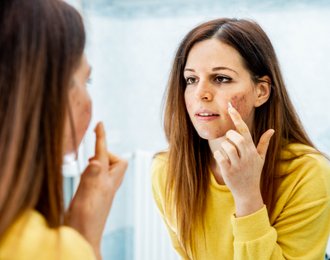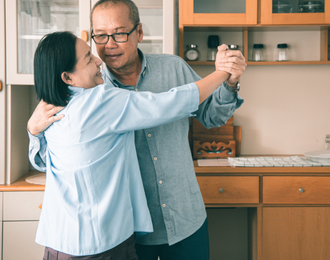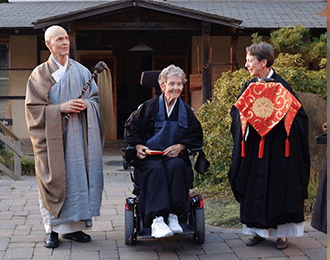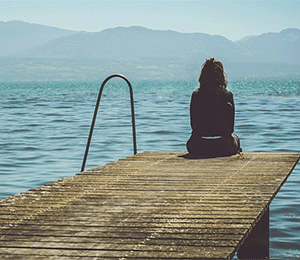Coping with Chemotherapy

UCSF Health – October 2021
Author: UCSF Staff
Chemotherapy Is an Individual Experience
Every person experiences chemotherapy differently, both physically and emotionally. Each person experiences side effects from chemotherapy differently, and different chemotherapy drugs cause different side effects. Fortunately, as the science of cancer treatment has advanced, so has the science of managing treatment side effects.
Whatever you experience, remember there is no relationship between how the chemotherapy makes you feel and whether you derive benefit from it.
Many people feel fine for the first few hours following chemotherapy. Usually, some reaction occurs about four to six hours later. However, some people don’t react until 12 or even 24 to 48 hours after treatment. Some people experience almost all of the side effects described below, while others experience almost none.
Your well-being is very important to us. There is a delicate balance between the benefits of chemotherapy and the harm of possible side effects. Please tell your doctor if you feel that the harm outweighs the benefit.
Before Starting Chemotherapy
Before starting chemotherapy we suggest that you take care of some of your basic health needs. If time permits, have your teeth cleaned before rather than while you are having chemotherapy. If you need major dental work, try to postpone it until after chemotherapy. If you need your teeth cleaned while receiving chemotherapy, please let your doctor or nurse know beforehand and discuss any concerns.
Emotional Support
You can have a family member, friend or support person accompany you to your chemotherapy sessions. We recognize that cancer has an impact on you as a whole person and also on your family and loved ones.
To varying degrees, all people with cancer struggle with the challenges of coping and adjusting to these life changes. At the Cancer Center, we have a number of programs to support you through the process, such as the Peer Support Program, support groups and individual counseling, that are available to all cancer patients.
Fever and Infection
Chemotherapy lowers the number of white blood cells (WBCs) your body makes. White blood cells are made in the bone marrow and help fight against infection. Neutrophils are one type of WBC that fights infection. Often your neutrophil count will determine whether or not you will receive chemotherapy on schedule.
A fever of 101° Fahrenheit (38.3° Celsius) or above, or chills with or without a fever, can be a serious sign of infection. You must call your cancer specialist if you experience these symptoms, even if it’s at night or on the weekend.
An infection is most likely to occur when your neutrophil count is low. You are most susceptible to a bacterial infection about seven to 12 days after your chemotherapy infusion. Most bacterial infections result from your body’s inability to fight off normal bacteria present in your gastrointestinal tract or skin. Bacterial infections do not commonly result from being in a crowded place. So, if you are feeling well, we encourage you to continue to go out to the movies or out for a meal.
However, viral infections such as colds and flu are common and are transmitted easily from other people. To reduce your chance of infection, wash your hands frequently and avoid close contact with anyone who is ill during this time.
Practical Hints Regarding Fever and Infection
- If you have a fever of 101° Fahrenheit (38.3° Celsius) or above, with or without chills, call your doctor or nurse immediately. If you cannot reach your cancer specialist, go to an emergency room.
- Keep a thermometer in your home and know how to take your temperature. Do not eat, drink or smoke for 10 minutes before taking your temperature. Leave the thermometer under your tongue for three minutes. If you are still unsure of how to take your temperature, ask your doctor or nurse.
- Call your doctor or nurse as soon as possible if you develop a cough, sore throat, pain or burning when you urinate.
- Wash hands frequently with soap and water to prevent infection.
- Avoid rectal intercourse, tampons, douches, enemas and rectal thermometers.
- Do not eat raw foods such as sushi and sashimi, Caesar salad or milk shakes made with raw eggs, until you complete chemotherapy and your blood counts have returned to adequate levels. Raw foods may carry bacteria that can lead to infection. Make sure to thoroughly wash fruits and vegetables.
- Wash hands and cutting boards well after food preparation.
- Always tell your doctor before going to the dentist.
The table below will help you understand your temperature in both Fahrenheit and Centigrade:
| Fahrenheit | Centigrade |
| 98.6° | 37° |
| 99° | 37.2° |
| 100° | 37.8° |
| 101° | 38.3° |
| 102° | 38.9° |
Remember, always call your doctor if you have a temperature of 101° Fahrenheit (38.3° Centigrade) or higher.
Flu-Like Symptoms
Around the third day following a chemotherapy treatment, some people may experience flu-like symptoms such as muscle aches and pains. If you experience these aches, you can take over-the-counter medications such as Tylenol or Advil. If necessary, contact your doctor for stronger medication.
Nausea
Medications called antiemetics or anti-nausea drugs are used to prevent and treat nausea and vomiting due to chemotherapy. Not all chemotherapy drugs cause nausea. Many anti-nausea drugs are available, and your doctor or nurse will recommend what is expected to work best for you.
If possible, have your prescriptions filled before your treatment day. Please call your doctor or nurse if your medications do not give you adequate relief or if you experience side effects with the anti-nausea medication.
Practical Hints for Nausea
- Eat a small, light meal before your chemotherapy appointment. Most people do better if they have something in their stomach.
- Eat what sounds good to you. In general, starches such as rice, bread, potatoes, hot cereals and puddings are well tolerated.
- Try not to skip meals. An empty stomach will worsen all symptoms. If you don’t feel like sitting down to a meal, try nibbling on something that appeals to you.
- Drink plenty of fluids. Herbal teas, water, sports drinks and diluted juices are recommended more than soda.
- Avoid unappealing smells.
- Freeze meals so you don’t have to cook. Ask your family and friends to help with meals, especially following chemotherapy when you are most likely to feel nauseated.
Fatigue
Chemotherapy can make you feel tired. This fatigue may or may not worsen as you are treated with more cycles of chemotherapy.
Most people have to make some adjustments in work and family responsibilities; the degree of change is very individual. Try to balance activity and rest. As much as possible, try to maintain your everyday activities. It can be very beneficial to both your physical and emotional recovery. The fatigue will go away after you recover from chemotherapy.
The Patient and Family Cancer Support Center also hosts monthly fatigue management workshops to address these concerns.
Practical Hints for Fatigue
- Plan your activities, such as grocery shopping, for a time when you feel the best.
- If you have children, rest when they are napping. When you feel most tired, consider hiring a babysitter for a few hours so that you can relax or take a nap.
- Take naps early in the day so you do not disturb your sleep pattern at night.
- Consider exercising every day or several times a week. Good forms of exercise include swimming, walking and yoga.
Hair Loss
Many people feel that hair loss is one of the most difficult aspects of chemotherapy treatment. Not all chemotherapy drugs cause hair loss, so talk to your physician or nurse about what to expect.
Most often, hair loss begins about two to three weeks after starting chemotherapy. Some people will lose relatively little hair, while others may lose the hair on their head, eyelashes, and eyebrows, as well as other body hair. You may want to cover your head with a wig, scarf, hat, or turban, or you may not want to cover your head at all. Do what makes you most comfortable. Many people choose different head coverings for different situations.
If you decide to buy a wig, try to buy one while you still have your own hair so you can better match color and style. You may want to ask your doctor for a prescription for a “cranial prosthesis” (i.e., a wig), as some insurance companies will only pay for a wig with a prescription for a cranial prosthesis.
Your hair will begin to grow back after you stop chemotherapy. It usually takes from two to three months to see the change from no hair to some hair. Your new hair may be slightly different in color and texture than your old hair. Often, the new hair will be baby soft and curly, but will generally return to its original texture after some time.
Practical Hints for Hair Loss
- It is not always necessary to buy a real wig. Synthetic wigs can look as good and are less expensive, easier to care for, lighter in weight and may be more comfortable to wear.
- Before possible hair loss, some people like to cut their hair short. The hair loss won’t be quite so shocking if there is less hair to lose.
- Put a towel over your pillow so that clean up in the morning will be easier while you are shedding your hair.
- Buy a drain catch for your shower. Other people choose to shave their head hair when hair loss begins.
- Refer to our wig information sheet for places to shop near you.
- When buying a wig, take a friend for emotional support and maybe even a laugh!
Appetite and Taste Changes
During chemotherapy, you may experience taste and appetite changes and a heightened sensitivity to odors. Don’t worry if you don’t have an appetite the first few days or a week following chemotherapy; it is not unusual. As you feel better, your appetite will improve.
Reflux – when food backs up into your esophagus – burping, or a burning sensation may worsen nausea. Please report these symptoms to your physician or nurse so that they can be treated. You may find that you can only tolerate certain foods. We encourage you to eat what appeals to you during this time, and to drink enough fluids: eight to 10 eight-ounce glasses per day, more if you have a fever or diarrhea.
Recommendations for healthy nutrition include a diet low in fat (less than 20 percent fat) and high in whole grains, fruits and vegetables, and plant-based proteins. Some people want to begin dietary changes during active therapy; others prefer to wait until chemotherapy is completed. Some people prefer small, slow changes, while others benefit from a “major overhaul.” We encourage you to become informed and make healthy dietary and lifestyle changes.
Practical Hints for Taste and Appetite Changes
- Eat what appeals to you during this time.
- Eat foods that are warm rather than hot.
- Avoid places where food is being cooked, such as the kitchen at dinnertime.
- Avoid unappealing smells.
- Try to drink eight to 10 glasses of fluid a day.
Diarrhea or Constipation
Some chemotherapy drugs can cause diarrhea. If you have more than three or four watery stools in 24 hours or blood in your stool, call your doctor or nurse. Do NOT use over the counter anti-diarrhea medications like Imodium unless advised to do so by your physician or nurse.
Some chemotherapy and anti-nausea drugs can cause constipation. Also, you may be more prone to constipation because your activity level and diet have changed. If you experience constipation, contact your doctor or nurse the same day.
Practical Hints for Constipation
- To help prevent constipation, drink eight to 10 glasses of fluid a day.
- Take a stool softener (not a laxative) such as ducosate sodium, also known as Colace, one tablet once or twice a day. Senekot or Senekot-S also may be suggested. Ask your doctor or nurse for a recommendation.
- Stay as active as you can. Consistent regular exercise can reduce constipation.
- If you can tolerate them, try high-fiber foods such as prunes, bran, fruits and vegetables.
Practical Hints for Diarrhea
- To replenish lost fluids, drink eight to 10 eight-ounce glasses of non-caffeinated fluids per day.
- If your rectum is sore, use soft toilet paper and A&D ointment (used for diaper rash in infants) or Anusol, which can help numb the rectum and soothe soreness.
Mouth Sores
Another side effect of chemotherapy can be mouth sores and discomfort when swallowing. Mouth sores occur because chemotherapy not only destroys cancer cells, but also rapidly dividing cells, such as those that line your mouth and esophagus. Please call your practitioner should you develop painful mouth sores or have difficulty swallowing. A special mouth rinse may be prescribed.
Practical Hints for Mouth Sores
- Brush your teeth with a soft toothbrush three times daily.
- Rinse your mouth with a solution of one teaspoon baking soda and one teaspoon of salt, diluted in a glass of lukewarm water, three or four times daily.
- Most commercial mouthwashes contain alcohol. Ask your health care provider about mouthwashes that are not irritating to your mouth.
- Ulcer-ease is a commercial product that may provide temporary relief from sores.
Neuropathy
Neuropathy, which means disease or dysfunction of the nerves, can happen to some people. Some of the most common symptoms of the type of neuropathy caused by chemotherapy include tingling and burning, numbness or pain in the affected areas, loss of your sense of position – knowing where a body part is without looking at it – and loss of balance. The most commonly affected areas are the tips of fingers and toes, although other areas are sometimes affected as well.
Tell your doctor about any symptoms that you experience. Early detection and treatment are the best way to control your symptoms and prevent further nerve damage.
Practical Hints Regarding Neuropathy
- Tight shoes and socks can worsen pain and tingling, and may lead to sores that won’t heal. Wear soft, loose cotton socks and padded shoes.
- If you have burning pain, cool your feet or hands in cold, but not icy, water for 15 minutes twice a day.
- Massage your hands and feet, or have someone massage them for you, to improve circulation, stimulate nerves and temporarily relieve pain.
Menopause
For women, chemotherapy may temporarily stop your periods or result in permanent menopause. The effects depend on the type of chemotherapy administered, your age and how close you are to naturally occurring menopause.
With menopause, you may experience symptoms such as hot flashes, decreased libido, vaginal dryness, mood changes and sleeping disturbances. If you experience any of these symptoms, talk to your doctor or nurse to get information and treatment for the symptoms.
If your periods continue during treatment, they are likely to change in duration, flow and regularity. The changes may be temporary, lasting only while on chemotherapy, or the changes may lead to menopause.
Practical Hints for Menopausal Symptoms
- If you have breast cancer, we DON’T recommend hormone replacement therapy.
- Eat soy products or take vitamin E (400 units only) to reduce hot flashes.
- Your doctor may recommend prescription medications for hot flashes.
- Wear light cotton pajamas to help prevent overheating when sleeping.
- Use vaginal moisturizers on a regular basis or other water-based lubricants as needed, especially during and before sexual activity. These products will help with vaginal dryness and irritation.
- Try an opened vitamin E capsule or olive oil spread on the vagina to increase lubrication.
- There are prescription medications that give a local dose of estrogen to the tissues in the vagina to treat vaginal dryness.





